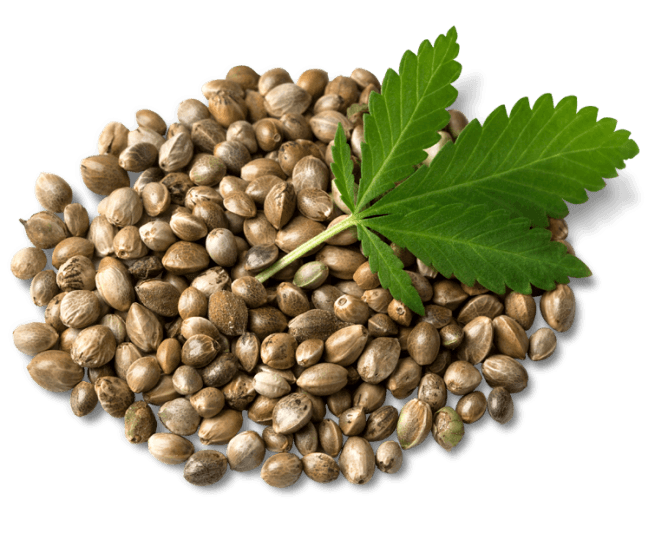Hemp 101
Hemp is a plant with thousands of uses that were first utilized over 10,000 years ago. Hemp is a particular variety of the Cannabis Sativa L. species that is grown specifically for its derived products. Although all of its uses have likely not been identified yet, currently hemp is used in an assortment of commercial products ranging from building materials to food.

What is Hemp?
Hemp, also known as industrial hemp or agricultural hemp, is a renewable, recyclable, and reusable agricultural crop. Hemp is a fast growing, tall and dense crop that is environmentally friendly and perfect for rotation. Unlike many crops, it requires minimal water and pesticides. Water requirements are 14 times lower than cotton. Additionally, through a process called phytoremediation the hemp plant actually absorbs toxins and heavy metals from the soil. This makes Hemp great for farmers and our planet.
With thousands of uses from its stalk, seed and flower, hemp is one amazing plant! Hemp seeds contain oil, nut, and cake that can be extracted and used in health foods, supplements, medication, body products, cosmetics, fuel, industrial materials, and animal food. The stalks contain hurd and bast fiber, used to produce construction materials, bio-composites, carpet, clothing, paper, cardboard, and biofuel to name a few.
Seeds
Actually an achene or a nut covered in a hard shell; hemp seeds are a true super food. They are high in protein, insoluble fiber, and essential fatty acids having the perfect ratio of 3:1 Omegas. They are also a great source of carotene, phosphorous, potassium, magnesium, sulfur, calcium, iron, zinc and vitamins E, C, and B. The achene can be hulled and the nut consumed whole or they can be used to produce bread, milks, cereal, granola, and protein powder.
Oil
The hempseed contains approximately 30% oil that is high in unsaturated fatty acids. The seed is cold pressed to extract the oil, which can be used for food, cosmetics, paint, ink, lubricants and fuel. Once pressed, the crushed seed is called the cake. The cake is high in amino acids and protein, and can be utilized for animal feed, flour, breads and pastas.
Fuel
Renewable hemp fuel is an area of research that will likely see breakthroughs in the next few years. Currently we know that biodiesel can be produced from hempseed oil. Additionally, ethanol and methanol can be produced from fermenting the whole plant. Several research programs are under way at universities across the country.
Bio-Composits
The application of hemp fiber as a reinforcement in composites is experiencing rapid growth. The hurd or woody material found in the center of the stalk is high in cellulose and silica making it great for bio-composites such as hempcrete and hemp bio-plastics. Hempcrete is an ideal material for building since it acts as an insulator and moisture regulator. Hemp bio-plastics are plant-based plastics with a low carbon footprint currently used in automotive manufacturing.
Textiles
Hemp used in textiles has a rich history on our planet. Once used to produce canvas sails for ships, the word canvas is derived from Cannabis. The bast of the hemp plant is the long fibers that surround the hurd of the stalk. The fibers can be up to 15 feet long. In contrast, cotton fibers are typically 1-2 mm long. Hemp fibers are also incredibly durable and are used to produce clothing, shoes, jewelry, rugs, upholstery and twine.
Paper
Hemp paper also has a rich history on our planet. The use of hemp to produce paper dates back to 200 BCE. Today, the majority of the hemp paper market is made up of cigarette paper production. Although, there is renewed interest in hemp paper due to its increased sustainable over paper produced from trees.
Extracts
CDB extract accounts for 40 percent of the plants’ total extracts. There are no intoxicating effects from CBD extract; in fact, it is considered to have an anti-high effect. Studies show that CBD is safe for human consumption at high dosages with positive results for anxiety, as well as anti-inflammatory benefits.
Foods
Hemp is one of the few plant-based, complete protein sources that contains all 9 amino acids. It is a great source of the Sulphur containing acids methionine and cysteine, which are necessary for cellular detoxification and production of vital enzymes. It also contains branched chain amino acids needed for muscle growth and repair.
Interested in learning more?
Reach out to us and we’ll be happy to help
